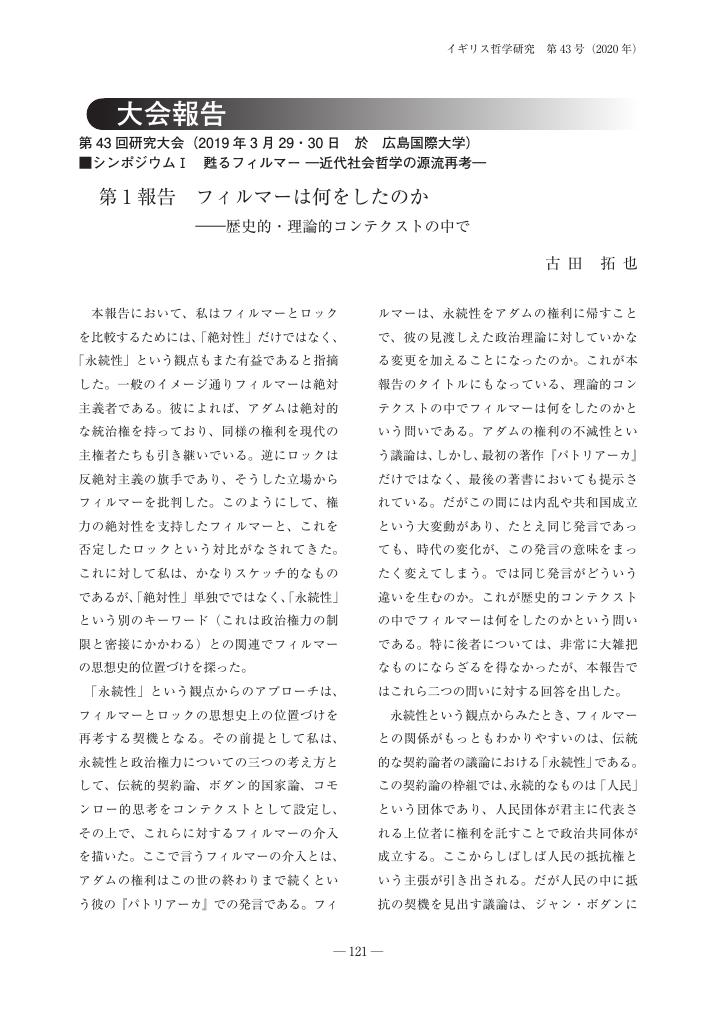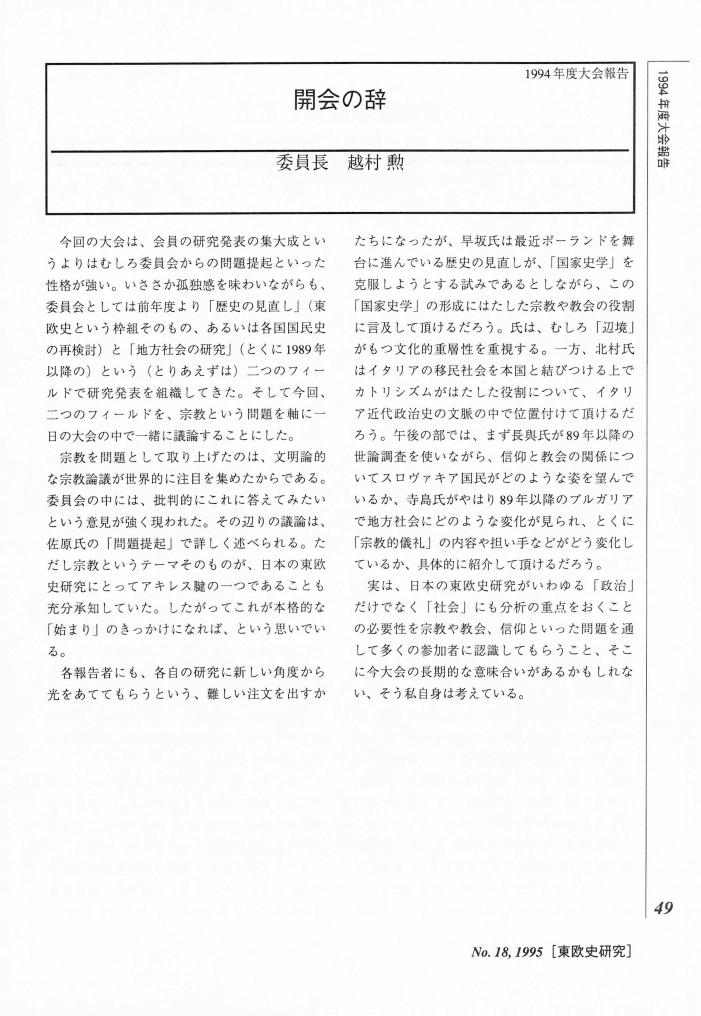1 0 0 0 OA フィールド・サイエンスの科学史,2012年度年会報告
1 0 0 0 OA シンポジウム:<昭和史>の中の人類学者-人類学と科学史の対話-2009年度年会報告-
1 0 0 0 OA アンケート結果からみた第104回日本消化器内視鏡学会近畿支部例会Web開催の功罪
- 著者
- 神田 暁博 脇坂 恭加 大槻 晋士 水田 寛郎 伊藤 明彦 辻川 知之
- 出版者
- 一般社団法人 日本消化器内視鏡学会
- 雑誌
- 日本消化器内視鏡学会雑誌 (ISSN:03871207)
- 巻号頁・発行日
- vol.63, no.7, pp.1397-1401, 2021 (Released:2021-07-20)
COVID-19感染の流行により,数々の学会が中止や延期,開催方法の変更を余儀なくされている.第104回日本消化器内視鏡学会近畿支部例会は,急遽Web閲覧方式に変更して開催した.発表演題は音声付きのパワーポイントスライドで2020年6月27日から2週間閲覧可能とした.参加は1,000人と過去の通常開催を上回る登録が得られた.アンケートからは自由な時間に閲覧できることや遠方でも参加しやすいなど肯定的な意見が多かった.一方,双方向での質疑応答ができなかったなどの問題も指摘された.今後の日本消化器内視鏡学会支部例会は,Web開催でも参加者が十分に議論に参加できるよう技術的な克服が課題である.
1 0 0 0 OA 大会報告
1 0 0 0 OA 書評
1 0 0 0 OA 書評
1 0 0 0 OA 書評
1 0 0 0 OA SLEに合併した自己免疫性膵炎の一例
- 著者
- 杉本 健 辻 剛 中澤 隆 豆原 彰 並木 充夫 森信 暁雄 河野 誠司 熊谷 俊一
- 出版者
- 日本臨床免疫学会
- 雑誌
- 日本臨床免疫学会総会抄録集 第35回日本臨床免疫学会総会抄録集 (ISSN:18803296)
- 巻号頁・発行日
- pp.84, 2007 (Released:2007-10-12)
(症例)71歳女性 (既往歴)65歳:顎下腺腫瘍、70歳:右膝全人工関節置換術後深部静脈血栓症 (家族歴)特記すべきことなし (現病歴)2007年2月下旬よりの下腿浮腫を主訴に当院消化器内科入院。入院後ネフローゼ症候群と診断され、精査中に画像上び漫性膵腫大、膵頭部腫瘤および一部狭窄と不整を伴う主膵管の拡張を指摘された。また、膵周囲、頚部、縦隔など全身リンパ節腫脹も認めた。頚部リンパ節生検から悪性リンパ腫や癌転移は否定され、膵頭部腫瘤については超音波内視鏡下穿刺吸引細胞診にて悪性所見は認めなかった。以上の所見とIgG4高値より自己免疫性膵炎と診断された。また口腔潰瘍、ネフローゼ、汎血球減少、dsDNA抗体陽性,抗核抗体陽性よりSLEと診断された。3月下旬に加療目的にて免疫内科転科となり、PSL(1mg/kg/day)による治療が開始された。膵頭部腫瘤、全身リンパの縮小と蛋白尿の消失、血球減少の改善を得た。 【考察】IgG4関連疾患として注目を浴びている自己免疫性膵炎を合併したSLEの症例を経験した。両者の合併は極めて稀であるため報告する。
1 0 0 0 OA 住居における対社会性の変遷と構造
- 著者
- 鈴木 成文 小林 秀樹 菊地 成朋 長沢 悟 小川 暁子
- 出版者
- 一般財団法人 住総研
- 雑誌
- 住宅建築研究所報 (ISSN:02865947)
- 巻号頁・発行日
- vol.11, pp.145-157, 1985 (Released:2018-05-01)
- 著者
- 西山 暁義
- 出版者
- 現代史研究会
- 雑誌
- 現代史研究 (ISSN:03868869)
- 巻号頁・発行日
- vol.64, pp.67-72, 2018-12-26 (Released:2021-10-23)
- 参考文献数
- 5
1 0 0 0 OA [解題]
- 著者
- 小野寺 拓也 西山 暁義
- 出版者
- 現代史研究会
- 雑誌
- 現代史研究 (ISSN:03868869)
- 巻号頁・発行日
- vol.57, pp.95-97, 2011-12-27 (Released:2017-07-01)
1 0 0 0 OA 1994年度東欧史研究会大会報告
1 0 0 0 OA トポロジカルフォトニクスと光回路
- 著者
- 雨宮 智宏 各務 響 岡田 祥 西山 伸彦 胡 暁
- 出版者
- The Institute of Electronics, Information and Communication Engineers
- 雑誌
- 電子情報通信学会論文誌 C (ISSN:13452827)
- 巻号頁・発行日
- vol.J105-C, no.9, pp.244-262, 2022-09-01
トポロジカルフォトニクスとは,光工学(フォトニクス)の分野に数学の位相幾何学(トポロジー)の概念を持ち込んだものであり,これにより,円偏光(光のスピン)や光渦(光の軌道角運動量)などの光のトポロジーに起因した情報を体系的に扱うことができるようになる.本論文では,トポロジカルフォトニクスの理論的枠組みに触れつつ,その実証に向けた分析技術・作製技術,及び光回路への応用について言及する.
1 0 0 0 OA 遺伝性球状赤血球症を合併した膵神経鞘腫の1例
- 著者
- 齋藤 晃 島田 紀朋 新谷 稔 山根 建樹 藤瀬 清隆 小林 正之 戸田 剛太郎 鳥海 弥寿雄 柳沢 暁
- 出版者
- 一般財団法人 日本消化器病学会
- 雑誌
- 日本消化器病学会雑誌 (ISSN:04466586)
- 巻号頁・発行日
- vol.102, no.5, pp.605-611, 2005 (Released:2005-06-14)
- 参考文献数
- 12
- 被引用文献数
- 3
症例は30歳,女性.黄疸と右季肋部の腫瘤を自覚し当科受診.貧血および間接型優位の高ビリルビン血症と腹部USにて膵頭部に60 mm大の嚢胞性腫瘤を認め入院.腫瘤はCTにて隔壁が一部造影される低吸収を示したが,ERCPや血管造影の特異的所見や腫瘍マーカーの上昇はなく,確定診断に至らなかった.貧血,黄疸は遺伝性球状赤血球症によるものと診断されたが,腫瘤は幽門輪温存膵頭十二指腸切除にて膵神経鞘腫と診断された.
1 0 0 0 OA 乳頭部神経内分泌腫瘍と多発小腸GISTを併発した神経線維腫症1型の1例
- 著者
- 北嶋 諒 森田 剛文 古橋 暁 木内 亮太 武田 真 菊池 寛利 渡邊 文利 杉本 健 坂口 孝宣 竹内 裕也
- 出版者
- 一般財団法人 日本消化器病学会
- 雑誌
- 日本消化器病学会雑誌 (ISSN:04466586)
- 巻号頁・発行日
- vol.116, no.7, pp.583-591, 2019-07-10 (Released:2019-07-10)
- 参考文献数
- 27
症例は60歳女性,貧血精査内視鏡検査でVater乳頭部腫瘍とその肛門側に粘膜下腫瘍を認めた.皮膚筋肉に多発する腫瘤やcafé au lait斑および乳頭部腫瘍生検より,神経線維腫症1型(NF1)に随伴する神経内分泌腫瘍(NET)と診断した.膵頭十二指腸切除術施行時,近位空腸漿膜に突出する結節が散在していた.病理上,乳頭部腫瘍はNET G2,乳頭肛門側腫瘍を含め他の腫瘍はいずれもGISTであった.本症例のような報告はまれである.
1 0 0 0 OA A.I.See: 多重化不可視映像技術を用いたボードゲームプレイ上達支援ツール
- 著者
- 古田 真緒 白井 暁彦
- 雑誌
- エンタテインメントコンピューティングシンポジウム2016論文集
- 巻号頁・発行日
- vol.2016, pp.52-54, 2016-11-05
体験者とAIがペアを組んでロボットを操作して将棋をプレイするツール「A.I.See」を提案する。体験者は専用の眼鏡をかけることでAIからヒントを貰い、将棋を楽しむと共に、強くなった感覚を得る事ができる。観戦者は、体験者同士が繰り広げるゲームやロボットの動きを見て楽しむ。表向きは人とAIが一緒に遊び、人を成長させる体験であるが、本ツールの真の目的はシンギュラリティを迎えた人類とAIの関係を体験可能にすることである。
1 0 0 0 IR 説一切有部における倶有因の定義
- 著者
- 箕浦 暁雄
- 出版者
- 大谷学会
- 雑誌
- 大谷大学研究年報 (ISSN:02896982)
- 巻号頁・発行日
- vol.56, pp.55-94, 2004-03
1 0 0 0 OA スポーツの場と真の対話
- 著者
- 片岡 暁夫 大島 徹 近藤 良享
- 出版者
- 日本体育・スポーツ哲学会
- 雑誌
- 体育・スポーツ哲学研究 (ISSN:09155104)
- 巻号頁・発行日
- vol.11, no.1, pp.3-12, 1989 (Released:2010-04-30)
1 0 0 0 OA 南イタリア・カラーブリア州における移民と農業 : いわゆる「大流出」の時期を中心に
- 著者
- 北村 暁夫
- 出版者
- 社会経済史学会
- 雑誌
- 社会経済史学 (ISSN:00380113)
- 巻号頁・発行日
- vol.59, no.2, pp.291-319,343, 1993-07-25 (Released:2017-07-01)
From the 1870s to the beginning of the First World War, numerous emigrants left Calabria, southern Italy, for the American countries. A large number of them were young single men who had worked in the agrarian sector in Italy. This article examinens the causes of the peasant emigration and its effects on rural areas in Calabria, using emigration statistics and contemporary surveys of agrarian inquiries. The emigration began in the northern part of the mountains of Calabria. Tha peasants of these areas traditionally participated in a subsistence economy supplemented by domestic industry and seasonal employment, especially in the plains, where the cereal latifondo was under cultivation. But when the decline in domestic industry and the consequent decrease in employment opportunities was accelerated by the agrarian crisis of the 1880s, many peasants were compelled to emigrate abroad as an alternative to traditional employment. Most emigrants eventually returned home and purchased a piece of lands. This disproves the contention that the emigration led to a general proletarialization of the peasants. While returnees with a lot of savings were able to become independent farmers, those who had not saved enough were forced to emigrate again, often permanently. In this way, the emigration charged the traditional subsistence economy and polarized the peasant structure of the area.
- 著者
- 黒田 久雄 神宮司 早織 林 暁嵐
- 出版者
- 一般社団法人 日本土壌肥料学会
- 雑誌
- 日本土壌肥料学会講演要旨集 63 (ISSN:02885840)
- 巻号頁・発行日
- pp.132, 2017-09-05 (Released:2018-05-28)











